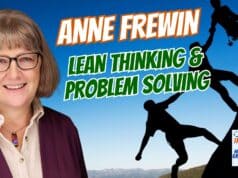I'm looking forward to reading the new book by Uri Levine, the founder of Waze. It's titled:
Fall in Love with the Problem, Not the Solution: A Handbook for Entrepreneurs
I hope to interview him on “My Favorite MIstake” because he talks about learning from failures.
Levine touches on this in a piece about him and his book in the New York Times (it's a free-reading link if you're not a subscriber).
Having a great idea is a necessary but not a sufficient condition for entrepreneurial success. “The importance of the idea is about 1 percent to 5 percent of the journey,” Levine wrote to me. “The rest is a long roller coaster journey of failures — hard work over a long time.”
We need to be learning from the “long roller coaster journey of failures” — we need to be learning from our mistakes so we can progress from small failures to big successes, as I write about in my own upcoming book.
More from Levine:
“Each iteration was launched with the conviction that it's going to work,” he said. The team learned from each failure. “What makes successful start-ups is the perseverance, the grit,” he said.
Loving the Problem, Not the First “Solution” We Come Up With
Levine gets asked why you should “love” the problem:
“To [Levine], loving the problem means remaining focused on customers' needs — the problem — rather than getting overly attached to your latest, maybe-not-so-good idea for serving those needs.
“Going back to 2007 — if I say I'm building an A.I., crowdsourced navigation system, you don't really care. If I tell you I'm going to help you avoid traffic jams, you do care,” he said.”
We hear that sentiment in modern startup thinking and practice, including in the “Lean Startup” framework.
But this thinking applies not just to innovation efforts. It also applies to smaller continuous improvement work.
One reason suggestion box systems fail is that the slip of paper starts with writing down your suggestion. That's your solution. But a solution to what problem?
Suggestion boxes quite literally ask us to jump to solutions. Except for the simplest and most trivial of workplace improvements, this can quickly get dysfunctional.
What I've found to work better is framing up an improvement opportunity as a pairing of:
- Problem
- Idea
If you make a suggestion or bring forward an idea, the typical suggestion box process is focused on approving or rejecting the solution. Loving it or casting it aside. Too often, the “problem-solving” stops when the suggestion is rejected.
In a Kaizen-style improvement process, start by identifying the problem or opportunity. If the initial idea or solution isn't feasible or doesn't work out, we keep ideating and iterating.
Our focus should be on solving the problem through cycles of Plan Do Study Adjust (PDSA).
Even if we move forward with a solution (or a “countermeasure”), we don't assume that it will work in practice. We love the problem… we suspect that we love the solution. But we either confirm or disprove the hypothesis that the solution is effective.
Too often, people fall in love with their first solution. They lock in on it. They refuse to consider alternative solutions before they move forward on something.
Whether we're trying to be innovative in a startup or we're tweaking an existing process in our workplace, it's really all the same thinking.
Love the problem. Be driven to solve it.
Have you been able to bring this thinking and practice into your workplace?
Please scroll down (or click) to post a comment. Connect with me on LinkedIn.
Let’s build a culture of continuous improvement and psychological safety—together. If you're a leader aiming for lasting change (not just more projects), I help organizations:
- Engage people at all levels in sustainable improvement
- Shift from fear of mistakes to learning from them
- Apply Lean thinking in practical, people-centered ways
Interested in coaching or a keynote talk? Let’s talk.
Join me for a Lean Healthcare Accelerator Trip to Japan! Learn More









